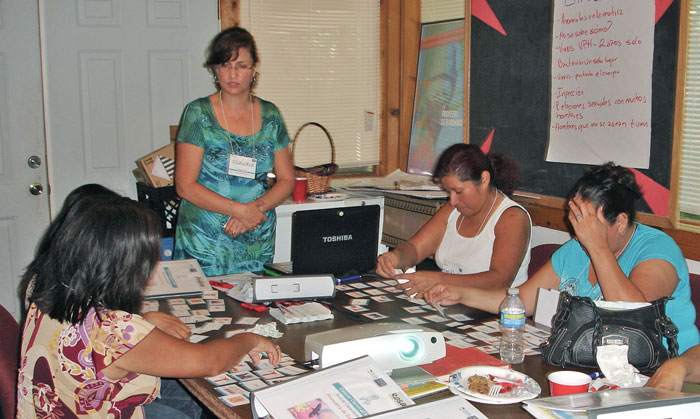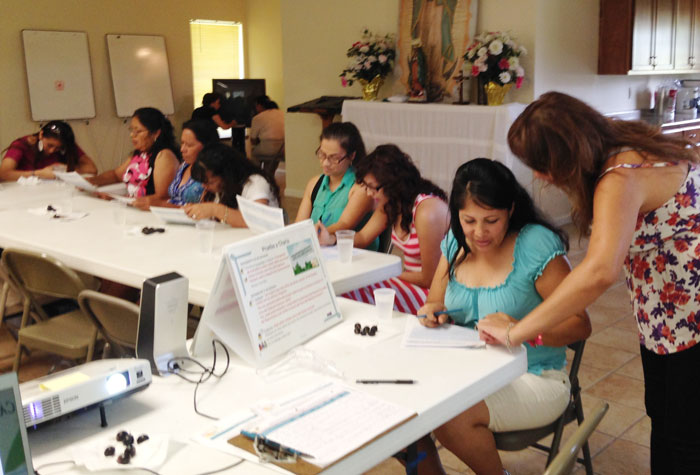Salud es Vida Cervical Cancer Education
- Need: To deliver information about cervical cancer to rural Hispanic women in the United States.
- Intervention: The development of a lay health worker (promotora) curriculum that provided information on cervical cancer, HPV, and the HPV vaccine to Hispanic farmworker women living in rural southern Georgia and South Carolina.
- Results: Significant increases in post-test scores relating to cervical cancer knowledge and increases in positive self-efficacy among promotoras.
Evidence-level
Effective (About evidence-level criteria)Description
Salud es Vida, which translates to “Health is Life,” was a curriculum and intervention program that was developed for promotora outreach in rural southern Georgia. Promotoras are lay health workers in the Hispanic community who can relay health-related information to community members. Specifically, the promotora training curriculum was designed to provide promotoras with training on cervical cancer, human papillomavirus (HPV), and the HPV vaccine so they could deliver education to Hispanic farmworker women.

Women in rural areas have increased difficulty getting connected to healthcare services, as some areas have a limited number of Spanish-speaking healthcare professionals. By providing peer-led education through promotoras, Salud es Vida worked to increase cervical cancer awareness and provide information about cervical cancer screening and the HPV vaccine.
In partnership with a Hispanic-serving nonprofit agency in southern Georgia, the study team developed two cervical cancer education modules, guided by previously developed curricula for diverse audiences and earlier ethnographic research of Hispanic farmworker women in Florida.
In a later phase of the research, the research team tested the intervention of group-based cervical cancer education sessions led by a promotora compared to a nutrition education control group for changes in Pap test receipt and cervical cancer knowledge among Hispanic women due for cervical cancer screening.
Funding was provided by the National Cancer Institute (NCI) at the National Institutes of Health.
Services offered
Over a timeframe of two weeks, seven volunteer promotoras completed two cervical cancer education modules, each of which took six hours to complete.
Topics covered in the first module:
- Female anatomy
- Cancer
- Cervical cancer
Topics covered in the second module:
- Cervical cancer screening
- HPV
- HPV vaccine
- Community health resources
Curriculum components:
- Slide presentations
- Vocabulary cards
- Discussion problem cards
- Cervical cancer screening resource list
- Icebreaker activities
The outreach toolkit for promotoras to conduct two-hour group education sessions, or charlas, with community participants consisted of a flipchart, a DVD, and a brochure. The toolkit also included a cervical cancer knowledge pre-test and post-test as well as other activities. View the following video (en español) to see one way these promotoras received training:
Results
Promotoras scored an average of 66% on their cervical cancer awareness pre-test. They performed significantly higher on their post-test, averaging a score of 80%. This indicates a significant increase in their cervical cancer knowledge.
All the promotoras conveyed positive self-efficacy in terms of receiving future Pap tests on a regular basis. They also expressed a willingness to promote positive awareness behaviors to the community members, such as promoting cancer screening.
A positive study outcome was the increase in community collaboration in research by involving the community partner in curriculum design. Importantly, the community partner valued the program, and the promotoras were involved with regular migrant health education and outreach activities.
Testing of the intervention with 90 women (38 women in the intervention group and 52 women in the control group) found significantly increased knowledge among intervention participants compared with the control participants. Increasing awareness and access to screening and the HPV vaccine through peer education is critical to reducing the cervical cancer burden in medically underserved Hispanic communities.
The intervention program was disseminated with community clinics and nonprofits in partnership with the MUSC Hollings Cancer Center in South Carolina. The program had also been replicated at the Vanderbilt-Ingram Cancer Center in Nashville, Tennessee, as part of its NCI National Outreach Network, Community Health Educator program's education and outreach activities. The program toolkit was also adapted in the country of Grenada.
In April 2018, the Centers for Disease Control and Prevention (CDC) published Public Health Strategies for Rural Cancer Policy Brief, which features Salud es Vida as a case study.
For more detailed program results:
Luque, J.S., Tarasenko, Y.N., Reyes-Garcia, C., Alfonso, M.L., Suazo, N., Rebing, L., & Ferris, D.G. (2017). Salud es Vida: A Cervical Cancer Screening Intervention for Rural Latina Immigrant Women. Journal of Cancer Education, 32(4), 690-99.
Luque, J.S., Mason, M., Reyes-Garcia, C., Hinojosa, A., & Meade, C.D. (2011). Salud es Vida: Development of a Cervical Cancer Education Curriculum for Promotora Outreach with Latina Farmworkers in Rural Southern Georgia. American Journal of Public Health, 101(12), 2233-35.
Supplemental articles:
Luque, J.S., Tarasenko, Y.N., Maupin, J.N., Alfonso, M.L., Watson, L.C., Reyes-Garcia, C., & Ferris, D.G. (2015). Cultural Beliefs and Understandings of Cervical Cancer among Mexican Immigrant Women in Southeast Georgia. Journal of Immigrant and Minority Health, 17(3), 713-21.
Watson-Johnson, L.C., Bhagatwala, J., Reyes-Garcia, C., Hinojosa, A., Mason, M., Meade, C.D., & Luque, J.S. (2012). Refinement of an Educational Toolkit to Promote Cervical Cancer Screening among Hispanic Immigrant Women in Rural Southern Georgia. Journal of Health Care for the Poor and Underserved, 23(4), 1704-11.
Luque, J.S., Castañeda, H., Martinez Tyson, D., Vargas, N., & Meade, C.D. (2012). Formative Research on HPV Vaccine Acceptability among Latina Farmworkers. Health Promotion Practice, 13(5), 617-25.
Luque, J.S., Castañeda, H., Martinez Tyson, D., Vargas, N., Proctor, S., & Meade, C.D. (2010). HPV Awareness among Latina Immigrants and Anglo American Women in the Southern U.S.: Cultural Models of Cervical Cancer Risk Factors and Beliefs. NAPA Bulletin, 34(1), 84-104.
Challenges
The promotoras felt that they would have benefited from having more time to complete some of the activities throughout the training modules.
Cultural barriers to cervical cancer screening identified by the promotoras included:
- Feelings of embarrassment
- Fear of the procedure
- Lack of permission from spouse to go to the clinic
- Financial burden
- Lack of transportation
- Language barrier
- Lack of motivation
- Time constraints
Replication
The toolkit may be adapted to specific areas according to demographics of the Hispanic population and level of formal education.
Promotoras must be selected from the local Hispanic population based on leadership skills, breadth of networks, and availability.
Promotoras received a $75 stipend for the training session. Other incentives could include onsite child care, transportation assistance, and meals.

Contact Information
Dr. John S. Luque, PhD, MPH, ProfessorFlorida A&M University College of Pharmacy and Pharmaceutical Sciences
john.luque@famu.edu
Topics
Cancer
Community health workers
Farmers and farmworkers
Health screening
Hispanic or Latino
Infectious diseases
Sexual and reproductive health
Vaccination
Wellness, health promotion, and disease prevention
Women
States served
Georgia, South Carolina
Date added
January 13, 2016
Date updated or reviewed
January 5, 2024
Suggested citation: Rural Health Information Hub, 2024. Salud es Vida Cervical Cancer Education [online]. Rural Health Information Hub. Available at: https://www.ruralhealthinfo.org/project-examples/879 [Accessed 11 December 2024]
Please contact the models and innovations contact directly for the most complete and current information about this program. Summaries of models and innovations are provided by RHIhub for your convenience. The programs described are not endorsed by RHIhub or by the Federal Office of Rural Health Policy. Each rural community should consider whether a particular project or approach is a good match for their community’s needs and capacity. While it is sometimes possible to adapt program components to match your resources, keep in mind that changes to the program design may impact results.
